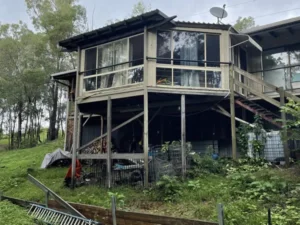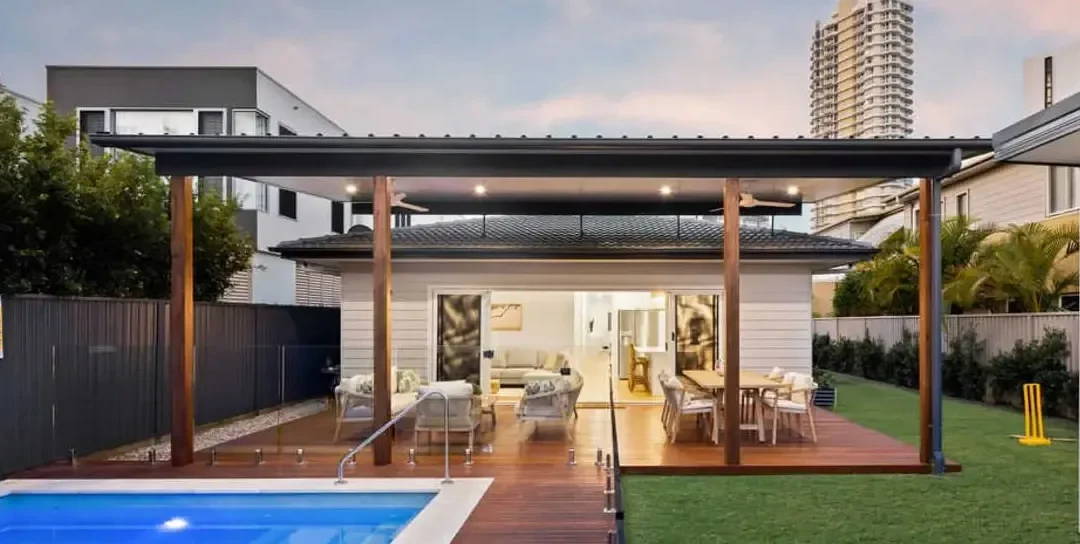House Extension Costs: Your 2025 Price Guide
Thinking of the cost of a house extension? In this article, we break down 2025 costs, average rates per square metre and key cost factors to help you plan.
Key Points
- In 2025, many homeowners are opting to build extensions rather than move, so costs vary depending on the design and planning.
- As a general rule, house extension costs start from $3,650 per square metre, with variations based on size and complexity.
- Ground floor extensions $4,200 to $5,800 per square metre, second storey additions $4,000 to $5,800 per square metre.
- A well-planned house extension can add up to 20% to your property value, so it’s a smart alternative to moving.
House Extension Costs 2025
 In 2025, urbanisation within the Gold Coast is prompting many homeowners to look inward, opting to expand their current homes rather than face the costs and hassle of moving. This shift in preference is having a significant impact on the overall market cost of house extensions.
In 2025, urbanisation within the Gold Coast is prompting many homeowners to look inward, opting to expand their current homes rather than face the costs and hassle of moving. This shift in preference is having a significant impact on the overall market cost of house extensions.
When comparing extending your home to moving to a bigger house, you need to consider all the costs involved in relocating, such as property purchase, moving expenses, and the government’s slush fund, “stamp duty.” In many cases, a home extension is a more cost-effective solution than moving to a new, bigger house.
Engaging a good designer will add value to your house extension project, but it will also increase the cost. Online cost calculators are a valuable tool for estimating basic project costs based on various inputs. However, costs can vary significantly depending on the designer, your vision, and your budget.
Good planning and execution are key to house extensions. The type of extension and its complexity will determine the final cost. A well-thought-out project will keep the budget in check and maximise your home’s value. Many homeowners with growing families opt to extend their current home rather than move to a larger house, as this approach allows them to meet their changing needs while managing costs.
Average Cost Per Square Metre for House Extensions
One of the first things to consider for a house extension is the cost per square metre. For ground floor extensions, you can expect to pay between $2,500 and $4,200 per square metre. A single-story extension is often the most cost-effective way to add space, especially for homes with yard area. Basic extensions, which are less complex, will be $3,650 to $4,500 per square metre. For smaller extensions, you may not need an architect; a building designer or draughtsperson can often manage the project efficiently.
Room extensions can vary greatly in cost depending on the room and its features. For example:
- Kitchen extensions are more expensive, ranging from $3,850 to $4,700 per square metre.
- Mid-range extensions, which include multiple rooms and higher-quality materials, will cost $4,800 to $6,200 per square metre.
- High-end extensions with luxury finishes will start at $6,200 per square metre and go up from there. Adding a second storey is another option, and while it can be more expensive per square metre than a ground floor extension ($4,200 to $5,800 per square metre), it saves on land use and can be a more space-efficient solution.
The exact cost of a house extension can’t be determined without detailed plans, specifications and consideration of factors such as size, materials and construction quality.
Types of House Extensions and Their Costs
Understanding the different types of house extensions and their costs will help you make an informed decision. Some types of extensions offer the most value in terms of increasing property value and enhancing your quality of life. Whether you’re considering a ground-floor extension, a second-storey addition, or a garage conversion, each option has its own set of financial considerations, and understanding the costs associated with home extensions is key.
Simple house extension projects in the Gold Coast will range from $150,000 to $340,000. However, more luxurious projects can cost $440,000 or more, so it’s essential to understand the home extension costs and benefits of each type of extension. Knowing the total costs of each extension type is necessary for making accurate decisions. Let’s get into the details.
Ground Floor Extensions

Additional premiums under the Home Building Compensation Fund, also known as a homeowners’ warranty, will add $3,000 to $6,000 to your project. Design complexity and individual project requirements also significantly contribute to determining the final cost.
Second Storey Extensions

Second-storey additions are ideal for extra bedrooms, home offices, or parents’ retreats, making them perfect for growing families. Second-storey extensions are especially suitable for creating additional bedrooms, particularly those with en-suite bathrooms, which can increase your home’s value and offer significant lifestyle benefits. They also preserve garden space below, which is a bonus for living spaces filled with natural light.
The extra cost of a second-storey extension is due to the additional structural requirements compared to a single-storey extension. However, the benefit of gaining more space without losing yard area makes double-storey extensions worthwhile, as you essentially double your floor space.
House Extension Costs
Several factors can impact the cost of your house extension. These include:
- The size and scope of the project
- Material choices
- Labour and professional fees
- Location, as extensions in regional areas, may be more affordable due to lower labour costs and fewer design restrictions
Understanding these factors will help you plan and budget more effectively for your home extension project.

- The complexity of the extension, partial or full extension
- Adding wet area rooms like bathrooms or kitchens
- Economic factors like inflation and supply chain disruptions can impact labour and material costs
- The condition of existing structures, as renovations may uncover surprises that increase costs
- Other expenses, such as plumbing, electrical work, and necessary upgrades, should be included in your budget or added as a contingency of 20%.
Location-specific factors, such as sloping land or poor soil quality, can increase the cost, as poor soil may require additional excavation, deeper foundations, or stabilisation techniques. Additional fees may also arise due to varying ground conditions. Knowing these can help you save on your extension project and still have comfort and practicality.
Size and Scope of the Project
The size and complexity of your home extension will significantly impact the total cost. Bigger extensions require more materials, labour, and time so that they will cost more. Complex designs that require more hours of skilled tradespeople will also cost more.
The extent of work required, one room versus multiple rooms, will impact the total cost. Knowing the scope of the project before you start is key to adding space.
Material Choices
Material choices can significantly impact the overall cost of your house extension. Choosing entry-level materials over luxury options will save costs. Material quality and availability can fluctuate the extension costs.
High-end options, such as hardwood flooring, will add cost but also increase value and appeal to your home.
Lower-cost materials will reduce the overall project cost. But you need to balance cost saving with durable and aesthetically pleasing materials.
Labour and Professional Fees
Labour costs can vary greatly depending on design complexity and contractor rates. The decision to engage an architect is often based on the project’s size and the homeowner’s aesthetic goals. While hiring certified professionals, such as highly skilled architects, will cost more than draftsmen, their qualifications justify the extra cost and can be the key differentiator in your final design.
Additionally, you need to factor in other costs, such as local council fees, which will contribute to the overall project cost, including the cost of materials.
Council Approvals and Permits
Obtaining council approvals ensures compliance with local regulations. The approval process typically takes 4 to 12 weeks, so it’s essential to plan ahead. Building approval from a licensed certifier is required before you start any extension work. Council Approvals
Council approval is required if your extension doesn’t meet the relevant code’s acceptable outcomes. Properties in heritage overlays or bushfire-prone areas may require additional assessments. If your construction work involves crossing or storing materials on a footpath, a footpath permit is required.
Development application fees, calculated using a base amount, vary based on the project. Planning permit fees also vary based on project size and location, making it challenging to budget. Not obtaining planning permission or making changes after the application can add to the cost and time.
Hidden and Unexpected Expenses.
It’s recommended to set aside 10-20% of the budget for unexpected expenses during construction. Having a contingency budget is key to covering unforeseen expenses that may arise, such as hidden structural issues or fluctuating material prices. Effective planning and communication can help mitigate the hidden costs associated with home extensions. Existing building items that are now non-compliant with current building regulations will require costly rectifications, such as rewiring, slab or pier subsidence.
Upgrading appliances may be required to match the new extension’s capacity and aesthetic. Energy-efficient appliances will save you money in the long term, making them a good investment. Adding air conditioning is a typical additional expense in extensions and should be factored into your budget. Hidden structural problems may arise during construction, potentially incurring extra costs.
Saving Money on Your House Extension
Planning can prevent costly interior design changes during the construction phase. A simple design by a building designer can keep structural costs under control. Minimising structural modifications to the existing home can save you a lot of labour costs.
To reduce overall cost, consider the following:
- Obtain multiple quotes from builders to secure competitive pricing and ensure each builder’s quote is detailed, including all aspects of the project, to avoid underestimating or overestimating total costs.
- Choose off-the-shelf products instead of custom-made fixtures to save money and get big savings.
- Manage some project tasks personally to reduce the overall cost.
Selecting the right builder for your project is crucial to ensuring high-quality workmanship and effective cost control.
Recycling materials from the site can reduce waste disposal costs. Incorporating money-saving strategies during a house extension can save you a significant amount without compromising quality.
Return on Investment for House Extensions
A well-done extension can add up to 20% to a property’s value, according to Ray White, Northern Beaches’ recent article. The return on investment from renovations can vary significantly depending on the location and demand of the property market, which can increase the potential for added value.
Adding an extra bedroom and bathroom can significantly increase a property’s value, especially in family-friendly suburbs. Greater customisation and improved lifestyle benefits are the main advantages of a house extension compared to moving.
Financial factors, such as agent fees and transaction costs, can make moving to a larger house more expensive than simply extending one’s current residence. A well-planned house extension not only adds value to your home but also provides you with extra space.
Gold Coast House Extension Costs
The cost of a house extension on the Gold Coast can range from $50,000 to over $250,000, depending on the size and level of luxury of the project. Basic house extensions cost between $1,800 – $2,700 per square metre. Mid-range extensions with more construction cost between $2,500 $4,000 per square metre.
High-end extensions with luxury finishes and complex designs can exceed $4,000 per square metre. Planning a house extension requires considering additional costs, including design fees, council approvals, and potential landscaping changes. Knowing the costs is crucial for effective budgeting.
Therefore, a single-storey house extension costs anywhere between $150,000 and $500,000 for high-end renovation extensions as of July 2025.
- Single-storey extensions: $150,000 to $500,000+
- Two-storey extensions: $180,000 to $1,200,000+
- Garage conversions: $80,000 to $210,000+
- Secondary Dwellings: $210,000 to $450,000+
In 2024, the typical homeowner spent $244,000 on renovations. The prices of bathroom and kitchen upgrades increased by 11% and 20%, respectively.
Summary
In summary, house extensions are a cost-effective way to add space and value to your home without the hassle of moving. Knowing the various costs, from per square metre to council approvals and hidden expenses, is crucial for effective project planning.
Whether you choose a ground-floor extension, second-storey addition, or garage conversion, proper planning and budgeting can help you achieve your dream home. Start planning today and transform your current home into your ideal living space. Enquire about how we can help.
FAQs
What is the cost per square metre for a house extension in 2025?
$1,800 to $3,000 per square metre for a ground floor extension and $3,800 to $4,500 per square metre for a second storey addition. If you’re going for luxury finishes, be prepared to pay over $4,000 per square metre.
What are the most significant factors that affect house extension cost?
Size and complexity of the extension, material choices and labour cost. Don’t forget to consider permits and potential unexpected issues that could increase your budget.
How long does it take to get council approval for a house extension?
Plan ahead for 4 to 12 weeks, and have all your permits ready to avoid any hiccups. Review the Gold Coast council fees/charges.
How can I save money on my house extension project?
Plan ahead, go for simple designs, and get multiple quotes from builders. Additionally, take on some tasks yourself and utilise off-the-shelf products or recycled materials to reduce costs.
If you’re looking for Renovation assistance and are unsure how to proceed with a house extension, please look no further. Risen have the teams and dedication for your planned extension to bring to life in ANY FORM, so reach out to us on 0404 736688, or online.






